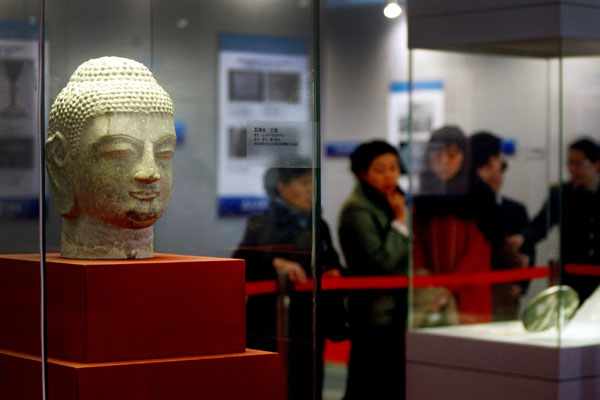Protection of relics needs more resources
Police and authorities protecting cultural relics plan to work more closely to fight the rising frequency of grave robbery and smuggling of cultural treasures in the country.
 |
|
Visitors admire the cultural relics seized from a national crackdown against grave robbery and relics smuggling, which are exhibited at the military museum in Beijing on Wednesday. |
The plan from the Ministry of Public Security and the State Administration of Cultural Heritage includes setting up joint offices between local police and cultural relics bureaus, according to the two departments.
"We're also considering rewarding members of the public who offer tips and report such crimes," Shan Jixiang, director of the State Administration of Cultural Heritage, said on Wednesday while attending an exhibition on a nationwide crackdown against grave robbery and relics smuggling.
Between the launch of the national crackdown in December 2009 and this June, authorities had cracked 541 cases, broken up 71 grave robbery gangs and smuggling groups, and seized 2,366 cultural relics, according to figures released on Wednesday.
Although grave digging and relics smuggling are banned in China, mouthwatering profits still lure an increasing number of people to take the risk, including some villagers living near historical sites, according to a press release from the exhibition.
It said crimes related to cultural relics in the country are becoming violent. Weapons are frequently used to fight police.
The release added that grave robbers are equipped with more advanced devices, such as GPS, metal detectors, specialized vehicles and explosive tools, which can seriously damage cultural sites and ancient graves.
In addition, the criminal groups have become more organized, with members responsible for specific tasks such as stealing, transferring, selling and smuggling the relics.
The shortage of funds at the local level has worsened the situation.
"We really lack support," said Han Yulin, a team leader of the special investigation police team in Xi'an of Northwest China's Shaanxi province, which is rich in cultural relics.
"There are only 17 policemen on our team, and we have to deal with all cultural relic crimes in Xi'an. It's almost impossible," he said.
Grave robbers in recent years have mainly targeted big ancient graves belonging to emperors and royal families.
"The local cultural relics bureau hires part-time workers to monitor the ancient graves, but they are often unprofessional and irresponsible," he said.
 0
0 






